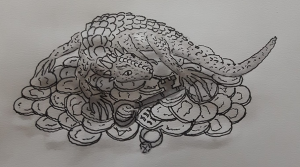Difference between revisions of "Burglar Lizard"
From World of Entorais Wiki
Jump to navigationJump to search (→Description: content) |
m (Text replacement - "Sub-Species" to "Notable Sub-Species") |
||
| (2 intermediate revisions by the same user not shown) | |||
| Line 3: | Line 3: | ||
;Common Names:Burglar Lizard | ;Common Names:Burglar Lizard | ||
;Classification:Reptile | ;Classification:Reptile | ||
These omnivorous pests are named for their habit of stealing shiny things and carrying them back to their nests. | :These omnivorous pests are named for their habit of stealing shiny things and carrying them back to their nests. | ||
==Description== | ==Description== | ||
| Line 20: | Line 20: | ||
;Intelligence:Clever animal. | ;Intelligence:Clever animal. | ||
;Reproduction:Females will lay clutches of up to a dozen eggs in their dens. Brooding them until hatching. Young remain in the colony unless the population pressure outstrips available food. | ;Reproduction:Females will lay clutches of up to a dozen eggs in their dens. Brooding them until hatching. Young remain in the colony unless the population pressure outstrips available food. | ||
;Gathering:These lizards are named for their behaviour of collecting small shiny objects. The small piles of coins, glass, metallic scraps, and other trinkets found in their dens is perhaps the source of the myth that dragons hoard gold and other wealth. | ;Gathering:These lizards are named for their behaviour of collecting small shiny or brightly coloured objects. In the wild this means small pebbles, feathers, flowers, and the like. Near Treahni dwellings they seem to have a preference towards metallic objects. The small piles of coins, glass, metallic scraps, and other trinkets found in their dens is perhaps the source of the myth that dragons hoard gold and other wealth. | ||
==Sub-Species== | ==Notable Sub-Species== | ||
:<!--list of sub-species with notable differences--> | :<!--list of sub-species with notable differences--> | ||
Latest revision as of 01:30, 20 April 2023
About
- Common Names
- Burglar Lizard
- Classification
- Reptile
- These omnivorous pests are named for their habit of stealing shiny things and carrying them back to their nests.
Description
- Size
- <0.25 kg (<0.5 pounds), <25 centimetres (<10 inches) length
- Appearance
- Scaled low profiled lizards, with four roughly equal length limbs, a longer pair of hind limbs, and tails making approximately 40% of their total body length. Small frill of spikes arrayed horizontally across the base of their skull protecting the neck, with heavier plate-like scales along the back.
- Sexual Dimorphism
- No obvious differences between the sexes.
- Variance
- Minor differences in colouration and patterning between subspecies.
Ecology
- Habitat
- Sub-Tropical to Temperate Forests, Scrub, Savanna. Sometimes found in urban environments.
- Diet
- Omnivorous, eating a variety of green plants, fruit, and small insects or other animals.
Behaviour
- Social Grouping
- Solitary or small groups numbering up to a dozen individuals living in a communal den.
- Temperament
- Cautiously curious, will approach non-threatening animals.
- Intelligence
- Clever animal.
- Reproduction
- Females will lay clutches of up to a dozen eggs in their dens. Brooding them until hatching. Young remain in the colony unless the population pressure outstrips available food.
- Gathering
- These lizards are named for their behaviour of collecting small shiny or brightly coloured objects. In the wild this means small pebbles, feathers, flowers, and the like. Near Treahni dwellings they seem to have a preference towards metallic objects. The small piles of coins, glass, metallic scraps, and other trinkets found in their dens is perhaps the source of the myth that dragons hoard gold and other wealth.
Notable Sub-Species
Domestication
- General
- None; Considered pests in urban environments.
- Resources
- Meat. Minor treasure if den located and raided.
